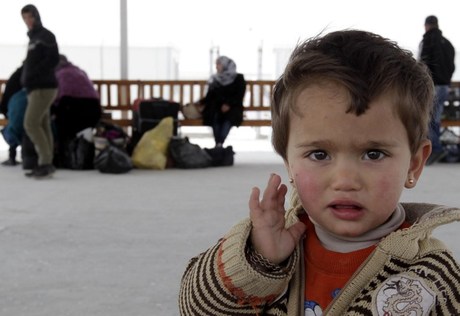U.N.: Syrian Refugees Face Recruitment as Fighters, Sexual Abuse
إقرأ هذا الخبر بالعربية
Syrians who flee their war-torn country face recruitment as child soldiers, sexual violence, and exploitation for labor, the U.N. refugee agency warned Tuesday, saying lawlessness in camps was driving exiles home.
In a report on aid efforts for the more than 1.8 million Syrian war refugees, mostly in neighboring Jordan, Lebanon and Iraq, UNHCR spotlighted the raft of ills they face.
"There are evil people in this world that exploit kids in vulnerable situations," UNHCR spokeswoman Melissa Fleming told reporters.
Jordan, Lebanon and Iraq each host hundreds of thousands of refugees, the majority in local communities rather than camps, stretching the countries' resources to near breaking point.
UNHCR flagged concerns about the large number of child refugees who were not receiving schooling, leaving them vulnerable to recruitment by armed groups that aim to take them back to fight in Syria.
Such recruitment was also a threat for adults, it said, while all refugees, including youngsters, risked being pressed into labor.
The report said domestic and sexual violence was a particular danger for refugee women and children.
"In some locations, refugees have also had to contend with the pressures placed on them by political and criminal elements within the exiled population," it added.
It also pointed to specific problems in camps -- notably the vast Zaatari site in Jordan which hosts 130,000 refugees, making it the equivalent of one of the largest cities in Jordan.
"Both organized crime networks and Syrian opposition groups operate in the camp, and use it to pursue their financial and political objectives," UNHCR said.
It dubbed Zaatari "lawless in many ways", saying a focus on infrastructure had come at the expense of ensuring it functioned as a community.
"As a result, the camp's resources are constantly stolen or vandalized," it said, adding that numerous UNHCR requests to Jordan to beef up security had failed to bear fruit.
"Given the harsh physical conditions to be found in Zaatari, coupled with the high level of criminality in the camp, it is not surprising to hear refugees speaking of their desire to 'escape'," UNHCR said.
"A growing number are doing so by returning to Syria, some of them taking advantage of changes in the security situation there and others going back to look after their property or visit family members. Such returns should continue to be closely monitored, so as to ensure that the decision to return is being freely made," it said.
It also highlighted abuses of Jordan's "bailing out" system -- which grants refugees official permission to live outside a camp if sponsored by a Jordanian -- saying a significant number were being charged up to $500.



